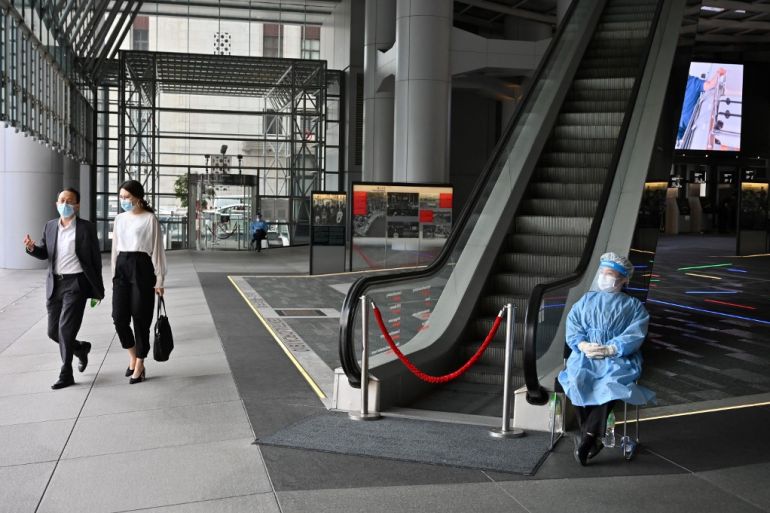‘Weaponised’ COVID restrictions stifle Hong Kong’s freedom
Residents and critics say new health regulations are encroaching on rights enshrined in the city’s constitution.

Hong Kong, China – Restaurant owners are compelled by authorities to subject their customers to contact tracing. Teachers are ordered to be tested for COVID-19 regularly once school resumes in person after Easter. Any time more than four protesters stand together, they risk stiff fines by police for violating social distancing regulations.
These are the new realities of life in Hong Kong.
Keep reading
list of 3 itemsVeteran Hong Kong democracy leaders convicted over peaceful rally
China approves overhaul of Hong Kong’s political system
For the better part of the past year, the city has been reporting the most new positive cases per capita of all China’s municipalities and battling local clusters like a game of whack-a-mole.
And the government here has resorted to draconian measures commonplace in mainland China to tackle the virus.
“Hong Kong’s leaders are under tremendous pressure from Beijing to contain COVID,” said Bruce Lui, senior lecturer at Hong Kong Baptist University and veteran political commentator.
“That’s why they aren’t above ruling with an iron fist in order to deliver and show Beijing they mean business.”
The passage of the national security law by Beijing last June, which criminalises protests and most forms of political organising, has cast a pall on the freewheeling city of 7.5 million, but health regulations are also encroaching on rights enshrined in the city’s own constitution.
‘No faith in government’
So far, teacher Chloe Leung has been doing her best to avoid the government’s controls.
As Leung has been teaching online, she was not yet subject to compulsory COVID-19 testing every two weeks. Distrustful of the government, she said she would not get the jab unless it is to keep her job.
The second-year teacher has been especially alarmed by unprecedented recent cases of experienced teachers being censured, or even suspended, for alleged political content in their teaching materials. She wondered if the testing for teachers only – but not the students – is monitoring masqueraded as a public health measure.
“I’ve got no faith in this government. Bit by bit, it’s stripping away our freedoms, challenging our bottom line to see how much it can get away with and counting on us becoming numb to all the assaults,” Leung told Al Jazeera.
This is what I called #revengeconsumption when covid is under control. #hongkong #retail pic.twitter.com/xA3dXGY9Uz
— Henry Chin (@HenryChinPhD) April 2, 2021
Freedom of assembly has been a conspicuous casualty of Hong Kong’s authoritarian turn.
Less than two years ago, protest marches of more than a million people met no police interference.
Now, under the Control and Prevention of Disease Ordinance, even a handful of high-school activists distributing leaflets in street corners would be dispersed by police under the threat of penalties.
Critics have said the legislation, amended late last April to limit public gatherings and enforce social distancing, has been “weaponised” to shut down any rally the government frowns upon.
The amendment predates the National Security Law imposed on the city by China.
Co-opting COVID restrictions
To district councillor Gary Poon, the government has co-opted the COVID campaign to stifle dissent.
“This government has spared no efforts on crackdowns,” said Poon. “It’s obvious political persecution is more important to them than fighting the virus.”
Last November, the entire pan-democracy camp of lawmakers was forced to quit the city’s legislature after four of their colleagues were barred by Beijing from serving.
Last month, 47 anti-establishment candidates who had run in a primary for the since-postponed legislative election were charged under the new security law with attempting to overthrow the government.
Councillors like Poon seldom are notified by health officials before they cordon off entire buildings, or even whole city blocks, for mandatory testing.
Caught unawares, residents and workers were forced to stay within the perimeters overnight.
‘Ambush lockdowns’
Such “ambush” lockdowns, as the Hong Kong government has called them, were common across mainland China at the start of the pandemic there a year ago. But in Hong Kong, these measures have been roundly condemned, even by some of the government’s allies.
In her government’s defence, Chief Executive Carrie Lam said in an early February news briefing, “Lockdown is first and foremost a preventive measure. What we’re trying to do is to get ahead of the spread of infections so the efficacy of the [ambush] operation can’t be gauged simply by the number of cases it’s found.”
And among those chafing at the government’s response, like restaurant owners and their customers, a form of grassroots resistance was forged.
Instead of asking their customers to scan the health department’s QR code and transmit their location, some owners have designed an alternative code that feeds into a Googleform which will be erased every 31 days, the period for which businesses are required by authorities to retain the data.
“The fear of being tracked is solid, especially in the current political climate. This is seen, at least in some quarters, as opening the Pandora’s box of surveillance, like what is taking place in the mainland,” said Dorothy Lui, core member of Public Health Research Collaborative, a health policy advocacy group formed in 2019.
“Don’t forget Hong Kong has historically been a laissez-faire society. This just doesn’t go down well.”
Baptist University’s Lui believes Hong Kong citizens are preparing for life under a more authoritarian regime even after the pandemic is over.
“The writing is on the wall that a strong-arm government is shaping up to take charge long after COVID is over,” he said.
“Now that the opposition has been eradicated and all protests squashed, Hong Kong’s officials will have no excuse but deliver on Beijing’s will.”